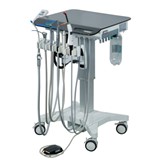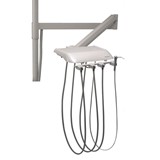Peak health organisations voiced their concerns about how federal budget policy would effectively place current progress into a holding pattern.
"The new (NPA) was to have commenced on 1 July 2014 and the states and territories have allowed for this when planning their services," Alison Verhoeven, Chief Executive, Australian Healthcare and Hospitals Association (AHHA), said in a recent statement.
"These services would have built on the progress to date and enabled additional care to be available to those who have the most difficulty accessing services and who have the greatest need."
Dr Karin Alexander, President of the Australian Dentists Association said: "The additional funding from NPA has enabled the various state and territory governments to reduce waiting lists by being able to provide 'vouchers for treatment' to those adults on the lists to have treatment provided by private dentists.
"If there is a delay or reduction in contributions from the commonwealth and no increased funding at the state level to dental care, the waiting lists will most likely increase again."
Approaches for a sustainable model
In order to maintain a sustainable dental health care model and prevent waiting lists from spiralling out of control, Dr Alexander said states and territories should where possible continue to use the 'vouchers for treatment' model, and actively educate the wider community about oral health preventative measures.
"There is significant capacity within the private sector to address waiting lists … the 'vouchers for treatment' model will allow patients with routine care to receive timely treatment from private dentists and free up resources," Dr Alexander said.
"Public dental services can then maximise their outputs by treating those patients with more complicated needs such as the elderly who often require support for their medical conditions, and children who need treatment under general anaesthetic.
"A greater emphasis on oral health education is also warranted as much of dental disease is preventable. Investing in prevention will reduce waiting lists in the long term."
Dr Alexander said such educational initiatives as the National Oral Health Plan have enormous potential benefits for the community.
"The National Oral Health Plan is a framework intended to guide oral health care in Australia thereby improving health outcomes and reducing the impact of oral disease on individuals, communities, the health system and society," she said.
"It has a specific focus on priority populations in need such as Indigenous Australians, remote communities, financially disadvantaged, aged care and patients with special needs.
"The Plan will be most effective if it is embraced by all levels of government and supported by investment."
Sound fiscal outcomes
Dr Alexander also said the ADA remains optimistic about provisions for the Child Dental Benefit Schedule and the Dental Relocation and Infrastructure Support Scheme, as well as the opportunity to renegotiate NPAs in the future.
"There was no reduction in funding to the Child Dental Benefit Schedule which is good, however the changes in eligibility criterion for Family Tax Benefit A will reduce the number of children that have access to the CDBS," she said.
"There has been a commitment to renegotiate the NPAs although this has been delayed but at least there will be more funding.
"Funding has also been maintained for the Dental Relocation and Infrastructure Support Scheme which provide financial support to dentists who establish a practice in rural and remote areas."
















